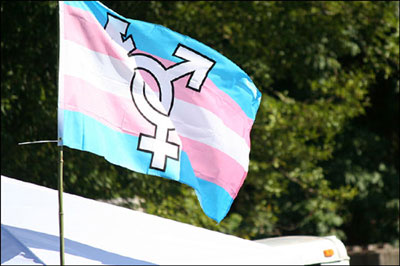
 Beyond Stigma and Bias, many Transgender people struggle with Mental Health
Beyond Stigma and Bias, many Transgender people struggle with Mental Health
By Davidc
Diana Feliz Oliva, a 45-year-old transgender woman who grew up outside Fresno, Calif., remembers being bullied when she was younger and feeling confused about her gender identity. She was depressed and fearful about being found out, and she prayed every night for God to take her while she slept.
“I was living in turmoil,” said Oliva, who now works as health program manager in a clinic for transgender people at St. John’s Well Child & Family Center in Los Angeles. “Every morning, I would wake up and I knew I would have to endure another day.”
Oliva’s experience is strikingly consistent with the findings of a new report from UCLA that shows transgender adults in California are more likely to have suicidal thoughts than other adults in the state, and more likely to have attempted suicide.
They are also more likely than their non-transgender peers to face severe psychological distress and to be disabled because of a physical or mental health condition, the report found.
The mental health gap is worrisome because it points to ongoing discrimination and bias, the study’s authors said.
The data — released last week as part of the annual UCLA California Health Interview Survey — highlight health disparities among a marginalized population. The survey, a collaboration between the UCLA Center for Health Policy Research and the Williams Institute at UCLA School of Law, covers demographics, access to health care and health status.
California prohibits discrimination against transgender people in employment, insurance, housing and public accommodations. Williams Institute researcher Bianca Wilson said the UCLA report underscores the need to determine how well these anti-discrimination policies are being implemented throughout the state. Across the nation, 30 states lack similar anti-discrimination laws, according to the study.
“There are also national debates and national policies that impact individual trans folks regardless of where they live in the country,” said Wilson, a senior scholar at the institute. “And on the national front, we still have a lot of work to do.”
Around the country, controversy has raged about transgender bathroom access and military service. The White House order banned transgender troops from serving in the military, but a federal judge on Monday blocked that policy temporarily, finding that it was probably unconstitutional.
“We have made some really great strides, but with this new political administration, people are living with an increased amount of anxiety and depression. Our community is at risk,” said Oliva.
In her late 20s, Oliva moved to Los Angeles, earned money as a sex worker and ended up spending time in jail. That’s when she decided she had better figure out who she truly was and what she wanted. She started her gender transition in her 20s and went to school at Cal State Los Angeles to study social work, eventually earning her master’s at Columbia University in New York.
The UCLA report, she said, is spot on. “Everything that report says is everything I experienced. I have gone through all the barriers and struggles and challenges.”
The data used in the UCLA study were collected in 2015 and 2016. About 92,000 Californians between the ages of 18 and 70 are living with a different gender identity than the one they had at birth, according to the study. Nearly half identify as transgender, while 32 percent identify as female and 7 percent as male. About two-thirds identify as non-Hispanic white — a higher percentage than among other adults. Transgender adults are also less likely to be Latino.
Transgender people differ markedly in sexual orientation from other adults. Just 28 percent of them said they were heterosexual, compared with 93 percent of adults who aren’t transgender.
They have similar levels of education, citizenship and poverty as those who aren’t transgender.
They also have similar rates of diabetes and asthma, but higher rates of HIV. The report found that transgender adults have similar health care access overall, but are more likely to delay filling prescriptions made by a doctor — or not get the prescriptions at all.
Stigma and bias likely contribute to the mental health problems among transgender people, said Cecilia Chung, senior director of strategic projects for the Oakland-based Transgender Law Center. Recent prohibitions — including on bathroom access and military service — have created a crisis in the transgender the community, she said.
“Their poor mental health will continue and worsen if our government continues to show hostility toward transgender people,” said Chung, a transgender woman. “The well-being of transgender citizens of our country is not being prioritized.”
More than 20 percent of transgender adults have attempted suicide, compared with about 4 percent of those who are not transgender. And they are over three times more likely to have had suicidal thoughts. One-third of transgender adults suffered serious psychological distress in the past year, compared with 9 percent of those who are not transgender.
Jody Herman, a scholar at the Williams Institute, said the study underscores the need for more training on transgender issues for mental health professionals. The study’s authors also urged more research on the health of the transgender population and of possible solutions to improve their mental and physical well-being.
Chung said she would like to see better answers to explain the differences in mental health — especially given the demographic similarities between transgender and non-transgender populations. “What actually sets them apart in terms of the health outcomes?” she asked. “What is the reason for the higher rates of suicide attempts?”
Oliva said that although she now has a job, insurance and an apartment, she still worries every day about getting physically assaulted for being a transgender woman. “My constant prayer on a daily basis is to make sure I stay alive,” she said.
KHN’s coverage in California is funded in part by Blue Shield of California Foundation
By Anna Gorman
This article was reprinted from Kaiser Health News with permission from the Henry J. Kaiser Family Foundation. Kaiser Health News, an editorially independent news service, is a program of the Kaiser Family Foundation, a nonpartisan health care policy research organization unaffiliated with Kaiser Permanente.


Be the first to comment